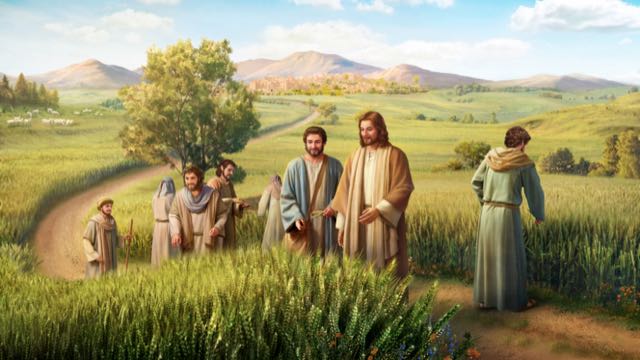By Su Jie
After one meeting, on the way back home I saw the golden ears of corn looked extremely brilliant in the sun and people were busy working in the corn fields. Then I couldn’t help but think of one verse: “Jesus went on the sabbath day through the corn; and his disciples were an hungered, and began to pluck the ears of corn and to eat” (Matthew 12:1). I quietly tried to ponder this verse and thought of the laws of the Old Testament. On the Sabbath, people could not do any work, and even weren’t allowed to save the calves that had fallen into a pit; they also could not casually go out or take part in activities but must observe the Sabbath at home; otherwise, they would be condemned for violating God’s laws. As the Scripture records: “And while the children of Israel were in the wilderness, they found a man that gathered sticks on the sabbath day. And they that found him gathering sticks brought him to Moses and Aaron, and to all the congregation. And they put him in ward, because it was not declared what should be done to him. And the LORD said to Moses, The man shall be surely put to death: all the congregation shall stone him with stones without the camp. And all the congregation brought him without the camp, and stoned him with stones, and he died; as the LORD commanded Moses” (Numbers 15:32-36). However, on the Sabbath the Lord Jesus took His disciples to preach and they picked and ate ears of corn when they were hungry. From these two passages, I could see that Jehovah God asked the common people to observe the Sabbath but the Lord Jesus didn’t observe it; then what is the significance of this work of God?
Lord Jesus’ Refusal to Observe the Sabbath
No matter how I thought, I couldn’t figure out this question; after asking my pastor and elders, I still got no satisfactory answer. So I came into the presence of the Lord and prayed: “Oh Lord! There’s something I’m not clear on. In the Age of Law, Jehovah God asked us humans to observe the Sabbath, but the Lord Jesus didn’t observe it when He came. Since they are the work done by one God, why is there a contradiction between them? But I believe that whatever You do has meaning and is of benefit to us. I’m willing to be enlightened by You and understand Your will. Amen!”
After a period of investigation, finally one day I saw a passage in a book: “When the Lord Jesus came, He used His practical actions to communicate to people: God had departed the Age of Law and had begun new work, and this new work did not require observation of the Sabbath; when God came out from the confines of the Sabbath day, this was just a foretaste of His new work, and His truly great work was continuing to play out. When the Lord Jesus began His work, He had already left behind the shackles of the Age of Law, and had broken through the regulations and principles from that age. In Him, there was no trace of anything related to the law; He had cast it off entirely and no longer observed it, and He no longer required mankind to observe it. So here you see that the Lord Jesus went through the corn fields on the Sabbath; the Lord did not rest, but was outside working. This action of His was a shock to people’s conceptions and communicated to them that He no longer lived under the law, and that He had left the confines of the Sabbath and appeared in front of mankind and in their midst in a new image, with a new way of working. This action of His told people that He had brought with Him new work that began with going out from the law and going out of the Sabbath. When God carried out His new work, He no longer clung to the past, and He was no longer concerned about the regulations of the Age of Law. Neither was He affected by His work in the previous age, but He worked as usual on the Sabbath and when His disciples were hungry, they could pick ears of corn to eat. This was all very normal in God’s eyes. God could have a new beginning for much of the work that He wants to do and the things that He wants to say. Once He has a new start, He neither mentions His previous work again nor continues it. For God has His principles in His work. When He wants to begin new work, it is when He wants to bring mankind into a new stage of His work, and when His work has entered a higher phase. If people continue to act according to the old sayings or regulations or continue to hold fast to them, He will not commemorate or praise this. This is because He has already brought new work, and has entered a new phase of His work. When He initiates new work, He appears to mankind with a completely new image, from a completely new angle, and in a completely new way so that people can see different aspects of His disposition and what He has and is. This is one of His goals in His new work” (“God’s Work, God’s Disposition, and God Himself III”).
Through praying to God and pondering these words, I thought: In the Age of Law, people didn’t know how to worship God, neither did they know rest. God asked them to observe the Sabbath and to worship and praise Him, and not to do any busy work on the Sabbath, so that they could receive rest from Him. So as long as people kept the commandment of Sabbath and performed no work on the Sabbath, they could find rest and gain care and protection from God. However, during the later stages of the Age of Law, as the human race had become more and more deeply corrupted by Satan, people could outwardly observe the Sabbath, worshiping and praising God, and not doing any work, yet they had no real worship for God within their hearts. Therefore, when the Lord Jesus came to work, He no longer required them to blindly observe the Sabbath on the surface. Instead, He asked them to rely on God and look to Him, entrust all their burdens to God, use heart and honesty to worship God; He also asked them to learn from Him and follow the example of Him. In this way, people would have something to lean on, enjoy the peace, joy, and bountiful grace bestowed by the Lord, find rest in Him, and live in God’s care, protection, and blessings.
At that time, I understood: The reason the Lord Jesus didn’t observe the Sabbath was that He, based on the demands of us corrupt humans, began a new stage of work and brought us a new means of practice. On the surface, He abolished the law, but in substance, He fulfilled it and caused people to turn from adhering to the rules of worshiping God to using heart and honesty to worship Him, which was a higher practice in worshiping God. When God begins His new work, He is not restrained by the laws and decrees, and He doesn’t hold to the work of the past. So if we still follow old-fashioned practices in the new age, no matter how well we follow, God will not commemorate it. As the parable of the Lord Jesus says: “No man also sews a piece of new cloth on an old garment: else the new piece that filled it up takes away from the old, and the rent is made worse. And no man puts new wine into old bottles: else the new wine does burst the bottles, and the wine is spilled, and the bottles will be marred: but new wine must be put into new bottles” (Mark 2:21-22).
Besides, we could see that if the Lord had not personally led His disciples to come out from the Sabbath, if He had not practically led people this way, no one would have exceeded the law but would have been constrained by the strictures of the law. Only when God continuously does new work can us people gain freedom and liberation and have a new path of practice.
If we don’t know the work of God and use the work of the past to constrain His new work, not only will we not be able to follow His new work, but we will also be punished for resisting Him. Just as the chief priests, scribes, and Pharisees slavishly abided by the law and rules, and used the Lord Jesus’ refusal to observe the Sabbath as their justification to condemn His new work. Moreover, they compared other work of the Lord Jesus with the work of Jehovah God; as long as there was a difference between them, they would condemn the work of the Lord Jesus. In the end, they nailed the Lord Jesus to the cross, losing God’s salvation and suffering His punishment.
The Lord Jesus’ refusal to observe the Sabbath gave me some inspiration: Regardless of where God works, or in what manner He works, or whether His work accords with our notions, we shouldn’t use His old work to constrain His new work, for He works with a plan, with a goal, and with principles. The wisdom of God soars higher than the heavens; His wondrousness is unfathomable to us humans; no matter how He works, His salvation and love for those who follow Him with a true heart can never be changed. It is precisely as the Bible says: “O the depth of the riches both of the wisdom and knowledge of God! how unsearchable are his judgments, and his ways past finding out! For who has known the mind of the Lord? or who has been his counselor?” (Romans 11:33-34).
Then I thought of what is prophesied in the Bible: “He which testifies these things said, Surely I come quickly. Amen. Even so, come, Lord Jesus” (Revelation 22:20). Now we are in the last days and the prophecy of the Lord’s return has already been fulfilled. How will He work when He returns? How should we treat His new work? The Bible says: “Blessed are the poor in spirit: for theirs is the kingdom of heaven” (Matthew 5:3), “These are they which follow the Lamb wherever he goes” (Revelation 14:4). Therefore, when someone says that God has come to do new work, we should not constrain it according to His work of the past; rather, we must seek and investigate it without delay. I believe that as long as we truly seek, God will lead us to know His work and gain His salvation.




